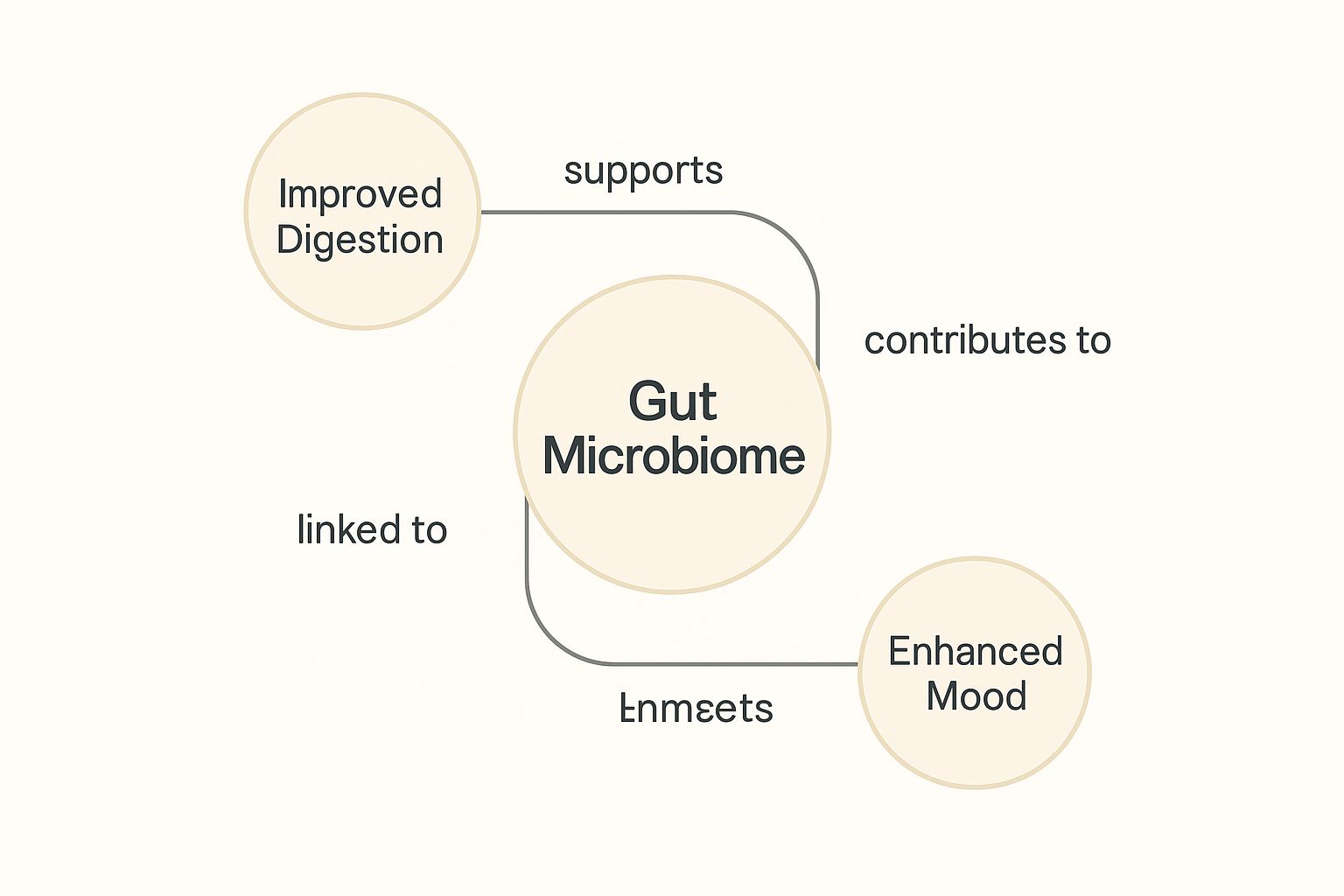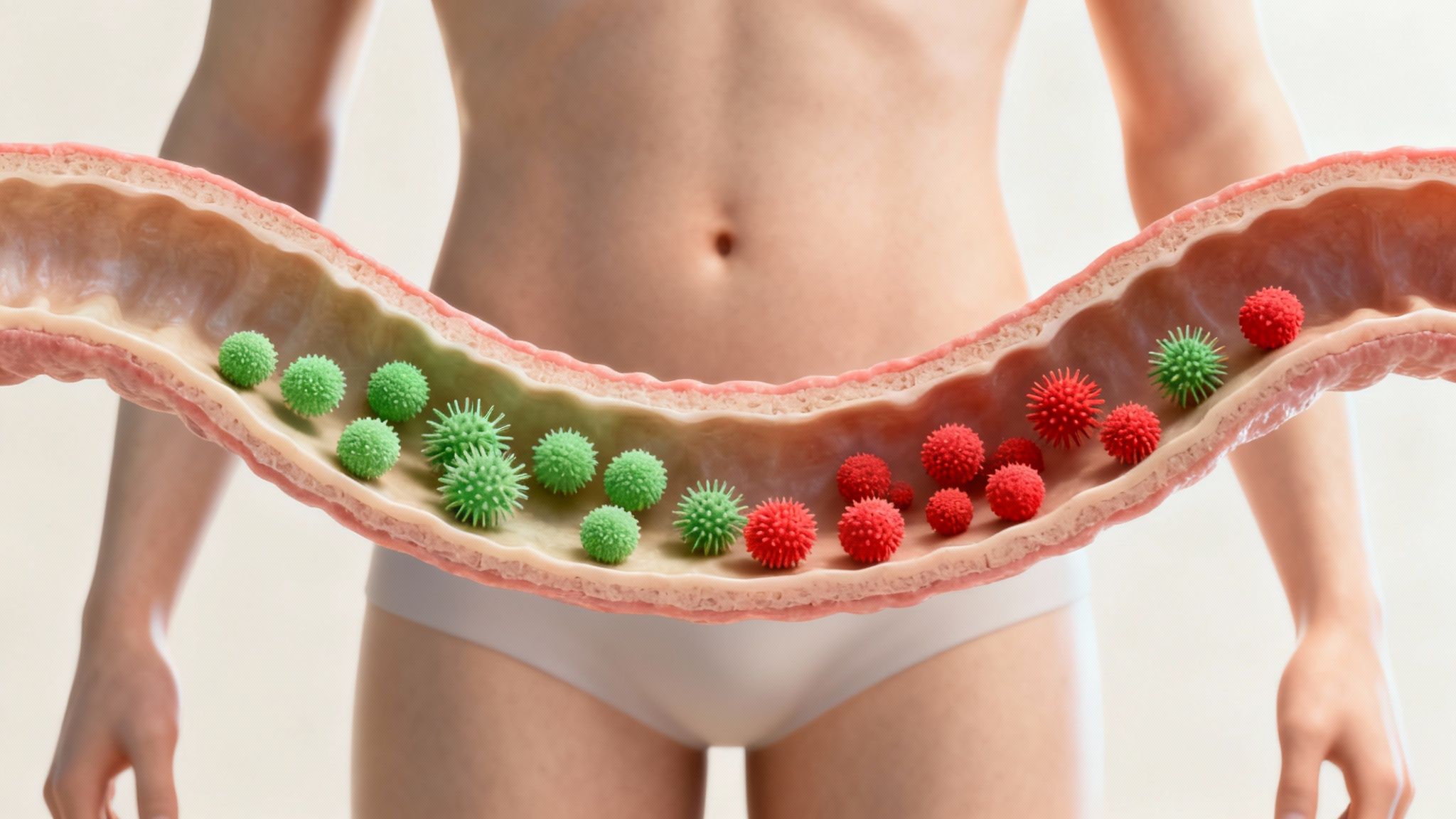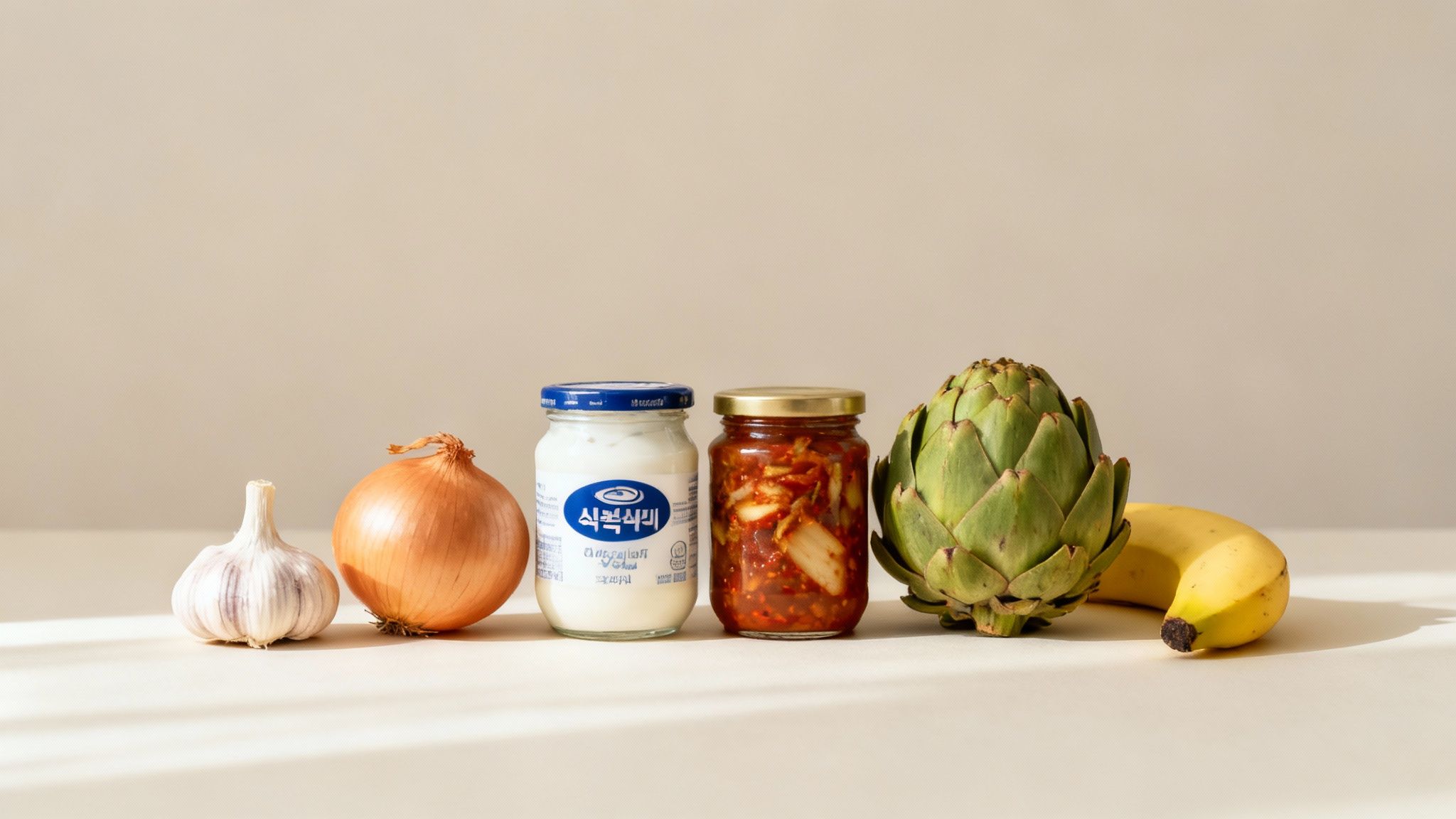Natural Ways to Improve Gut Health and Finally Beat Bloating
Ever feel like your stomach inflates like a balloon by afternoon? You’re not alone—and it’s not just what you ate for lunch. That uncomfortable, bloated feeling is something many of us know all too well. We get it, and it's frustrating when your body feels like it's working against you.
The good news is, finding digestive peace isn't about some radical, restrictive diet. It's about making simple, sustainable changes that naturally improve your gut health. In this guide, we'll walk you through practical, natural ways to improve gut health, from the foods that feed your friendly microbes to the daily habits that make all the difference. We’re in this together, and by the end, you'll have a clear, actionable plan to feel better from the inside out.
The Gut-Body Connection: It’s More Than Just Your Stomach
Improving your gut health is about so much more than just calming your stomach. A healthy gut microbiome—that community of trillions of microorganisms in your digestive tract—is tied to nearly every aspect of your well-being. This infographic really drives home the powerful link between a balanced gut and your overall health.

As you can see, nurturing your gut microbiome can lead to smoother digestion, a more robust immune system, and even a more stable mood. It’s all connected.
What to Expect on This Journey
Think of us as your friendly, evidence-backed guide to making peace with your digestive system. Together, we'll walk through actionable steps you can start implementing today. We’ll cover:
- Understanding the "Why": First, we'll break down the science behind your microbiome in a way that actually makes sense—no biology degree required.
- Food as Your Ally: You'll discover the best foods to add to your plate for a happy gut, from prebiotics that feed your good bacteria to probiotics that add more to the team.
- Lifestyle Tweaks: We'll look at how small changes in your daily routine, like managing stress and prioritizing sleep, can make a massive difference.
- Smart Support: We’ll also touch on how targeted supplements, like Yuve’s plant-based enzymes, are a core solution for offering that extra bit of consistent support when life gets in the way of a perfect diet.
Ready to start feeling better from the inside out? Let’s begin.
Understanding Your Gut Microbiome: Meet Your Inner Garden

Before we dive into the specific foods and habits that support gut health, let's get acquainted with the star of the show: your gut microbiome. And don't worry, this isn't going to be a dry science lecture.
Imagine your gut is a bustling, vibrant garden teeming with trillions of microscopic residents—bacteria, fungi, and viruses. This inner metropolis is unbelievably complex, home to hundreds or even thousands of different species.
Like any well-run garden, balance is everything. When this microscopic community is in harmony, it works tirelessly for you, helping with everything from digesting your food to producing critical vitamins. But when things get out of whack—and the weeds start to outnumber the flowers—that’s when issues like bloating and discomfort can pop up. Dun, dun, dun... unwelcome gas. Yikes!
The Good Guys vs. The Troublemakers
In this gut garden of yours, there are two main groups of residents: the beneficial bacteria (the good guys) and the potentially disruptive ones (the troublemakers). The good guys are the true heroes here. They help break down fiber, fortify your immune system, and even create compounds that can influence your mood. Think of them as the essential workers keeping the garden flourishing.
The "bad" bacteria, on the other hand, aren't inherently evil, but they can definitely stir up trouble if their populations get too large. An overgrowth of these microbes can lead to inflammation, gas, and that all-too-familiar bloated feeling. The goal isn't to completely wipe them out; it's to maintain a healthy balance where the good guys are clearly in charge.
A diverse and balanced gut microbiome is one of your body’s greatest assets. It’s not just about avoiding stomachaches; it’s about supporting your overall well-being from the inside out.
Science Corner: Why Gut Diversity Matters So Much
A truly thriving gut garden is a diverse one. The more varied the species of good bacteria you have, the more resilient and capable your microbiome becomes. Each type of bacteria has a specialized role, so having a wide variety ensures all the necessary jobs get done right.
It’s like having a highly skilled gardening team. Some bacteria are experts at breaking down tough leafy greens, while others are pros at fermenting fibers from beans and grains. A diverse team can handle pretty much any food you send its way, which translates to better nutrient absorption and smoother digestion for you. This is the central idea behind finding natural ways to improve gut health.
Modern research keeps confirming how unique each person's microbiome is. For example, a major study in early 2024 analyzed over 160,000 gut samples from 68 countries and found incredible variations based on location, age, and health. You can dig into the fascinating findings on global gut health to learn more. What this means for you is that a personalized, gentle approach is critical.
This is exactly why our founder, Sam, learned this the hard way. He battled digestive issues for years, trying one restrictive diet after another with no success. It was only when he shifted his focus from eliminating foods to adding a wide variety of plant-based foods to nourish his gut bacteria that he found lasting relief. His journey is what sparked the creation of Yuve—to help others support their own unique gut microbiomes with clean, effective nutrition.
Nourish Your Gut with Prebiotics and Probiotics

Alright, let's get into the nitty-gritty of using food to your gut's advantage. If you think of your microbiome as a garden, prebiotics and probiotics are your essential gardening tools.
It’s a simple but powerful analogy: prebiotics are the fertilizer that nourishes the good stuff already there, and probiotics are the seeds you plant to grow more.
This isn't about restrictive dieting. It's about consciously adding powerhouse foods that actively support your digestive wellness. The goal is to build simple, sustainable habits that make you feel good. To really make this work, it helps in understanding the roles of prebiotics and probiotics and how they team up.
Simple Prebiotic Swaps to Feed Your Good Bacteria
So, what exactly are prebiotics? Think of them as food for your friendly gut microbes. They're specific types of fiber your body can't digest, so they make their way down to your large intestine, where your gut bacteria have a feast.
This process helps the good guys multiply, creating a more robust and balanced inner ecosystem. The best part? You don't need fancy, exotic ingredients.
You likely have prebiotic-rich foods in your kitchen right now:
- Garlic & Onions: These everyday staples are loaded with prebiotic fibers. Tossing them into soups, stir-fries, and sauces is an effortless way to get more.
- Bananas: A slightly green banana is an amazing source of resistant starch, a fantastic prebiotic. Slice one up for your morning oatmeal or grab one for a snack.
- Oats: That comforting bowl of oatmeal is doing more than just warming you up; it’s delivering beta-glucan fiber that your beneficial bacteria love.
- Asparagus: Whether you roast, steam, or grill it, asparagus is another delicious veggie that feeds your gut.
Effortless Probiotic Boosts for a Thriving Gut
Now for probiotics. These are the actual live, beneficial bacteria. When you eat probiotic-rich foods, you’re directly introducing more helpful residents into your gut community.
Fermented foods are the best natural source for these microscopic allies.
Adding just one serving of fermented food to your daily routine can make a real difference in how your digestive system feels. It’s a small change with a potentially big payoff.
Here are some easy ways to get more probiotics on your plate:
- Yogurt with Live Cultures: Always check the label for "live and active cultures." This is your guarantee that you're getting the good stuff.
- Kimchi & Sauerkraut: These tangy, fermented cabbages are probiotic powerhouses. A spoonful adds a delicious kick to salads, grain bowls, or even scrambled eggs.
- Kefir: Think of this fermented drink as a super-charged, drinkable yogurt. It’s often packed with even more probiotic strains and is perfect for smoothies.
- Miso: This fermented soybean paste makes for a quick, gut-warming soup and adds a deep, savory flavor to dressings and marinades.
We know that navigating the world of probiotics can feel like a lot, especially with specific dietary needs. That’s why we created a guide to the best probiotics for vegans to make it easier to find high-quality, plant-based options that work for your body and your values.
Lifestyle Habits That Transform Your Digestion

While feeding your gut the right foods is a massive step forward, it’s really only half the story. Your daily habits—the way you move, think, and rest—are just as powerful when it comes to digestive wellness.
We’ve all felt that knot in our stomach before a big presentation or the sluggish, heavy feeling after a sleepless night. That's not just in your head; it’s your gut responding directly to your life. Making small, consistent lifestyle changes is one of the most effective natural ways to improve gut health, and these shifts can lead to profound, lasting improvements.
Tame Stress and Soothe Your Stomach
Ever notice how stress seems to go straight to your gut? That’s the gut-brain axis in action. Your brain and gut are in constant, direct communication. When you feel stressed, your brain sends out alarm signals, and your gut often takes the hit, leading to cramping, bloating, or other digestive drama.
The good news is that you can use this powerful connection to your advantage. By calming your mind, you can directly calm your gut.
- Practice Deep Belly Breathing: Before you eat, take five slow, deep breaths, letting your belly expand. This simple act flips the switch on your "rest and digest" nervous system, telling your body it's safe to focus on digesting your meal.
- Find Your Calm: Whether it’s a gentle walk outside, listening to a favorite album, or just five minutes of quiet time with a cup of tea, find a stress-management ritual that works for you. Your gut will thank you for it.
Embrace Mindful Eating for Better Digestion
In our fast-paced world, it's so easy to inhale our meals without a second thought. But how you eat is just as important as what you eat. This is where mindful eating comes in, and it's a total game-changer for digestion.
When you eat mindfully, you give your body the proper heads-up it needs to prepare for the food that’s coming. It starts producing the necessary stomach acid and enzymes before you even take your first bite.
One of the kindest things you can do for your digestive system is to slow down. Simply chewing your food thoroughly can significantly reduce bloating and gas by easing the workload on your stomach.
Here’s how to get started:
- Chew, Chew, Chew: Seriously. Aim to chew each bite until it’s almost liquid. This breaks down food mechanically and lets the enzymes in your saliva kick off the whole digestive process.
- Ditch Distractions: Step away from your desk, turn off the TV, and put your phone down. Focusing only on your meal helps you tune into your body’s hunger and fullness signals much more accurately.
- Appreciate Your Food: Take a moment to notice the colors, smells, and textures on your plate. This simple act of gratitude can make your meal far more satisfying.
Prioritize Sleep and Hydration for Gut Repair
Your gut doesn’t just clock out when you go to sleep—it goes into repair mode. Quality sleep is absolutely essential for maintaining a healthy gut lining and keeping your microbiome in balance. Aiming for 7-9 hours of restorative sleep each night gives your body the time it needs to reduce inflammation and support the growth of all those beneficial bacteria.
Likewise, hydration is fundamental. Water is crucial for everything from breaking down food and absorbing nutrients to keeping things moving smoothly through your digestive tract to prevent constipation. Proper hydration with clean water is key; investing in a reverse osmosis drinking water system can help ensure you're consuming the purest water possible.
Smart Supplements: Your Gut’s Best Friend
Let's be honest—even with the best intentions, maintaining a perfect diet and lifestyle isn't always realistic. Life gets busy, and our modern world can easily throw our gut health goals off track. This is where smart, targeted supplements come in. They aren’t a magic bullet, but they are an incredibly reliable tool to support your healthy habits and fill in any nutritional gaps.
Think of them as a dependable assistant for your digestive system. While whole foods should always be your foundation, supplements are a smart, proactive step to feel great and enjoy food without discomfort.
Why Supplements Are a Core Part of the Solution
Supplements don't replace a healthy diet; they amplify it. They deliver specific compounds in potent forms that can help your body process certain foods more effectively or simply ensure your gut has the daily resources it needs to flourish.
For example, does a creamy pasta dish or a slice of cheese pizza leave you feeling bloated and uncomfortable? You're definitely not alone. I do NOT think you have to banish dairy from your life forever. A targeted digestive enzyme is a total game-changer here.
Yuve Lactase Enzymes are a go-to for dairy nights. When you take them before a dairy-heavy meal, you’re giving your body the specific enzyme it needs to break down lactose (the sugar in milk). Suddenly, pizza night can be something to get excited about again, without that dreaded digestive aftermath.
Personal Story: Finding Freedom from Food Fear
We get to hear stories like this all the time from our community. Take Sarah, one of our long-time customers. For years, she would politely decline dessert at family gatherings because it was almost always ice cream cake, which she knew would leave her feeling miserable for hours.
"I thought I just had to accept that I couldn't eat my favorite foods," Sarah told us. "Discovering Yuve’s lactase enzymes changed everything. Now, I can join in and actually enjoy myself without worrying. It feels like I got a part of my social life back."
Stories like Sarah's are the entire reason we do what we do. It’s about giving you the freedom to live your life to the fullest. To learn more, check out our guide on other powerful natural supplements for gut health.
Daily Support for Smoother Digestion
Beyond specific food triggers, sometimes our digestive system just needs a little daily encouragement to run smoothly. This is where a broad-spectrum enzyme supplement makes a world of difference.
Our Yuve Papaya Enzymes support daily digestion, making balanced eating easier. They’re packed with papain, an enzyme from papaya that’s fantastic at breaking down proteins. This makes meals easier on your stomach and promotes better digestion overall, ensuring you absorb all the goodness from the healthy food you're eating.
Quick Wins for Better Gut Health Today
Feeling inspired and ready to make a change? That’s fantastic. The great news is you don’t have to wait weeks to start feeling better. You can kickstart your journey to a healthier gut with a few simple, powerful actions you take today.
This isn't about some massive, intimidating life overhaul. It’s all about small, consistent wins that really add up over time. Think of this as your starting line for a happier, more comfortable gut.
Your Actionable Checklist for a Happier Gut
Here are a few easy, actionable steps you can weave into your day right now without feeling overwhelmed.
- Add One Fermented Food to Your Lunch: Just a spoonful of kimchi, a side of sauerkraut, or a glass of kefir can introduce millions of beneficial bacteria into your system.
- Take a Five-Minute Walk After Eating: A little gentle movement is amazing for digestion. It helps get things moving and can prevent that heavy, bloated feeling after a meal.
- Drink One Extra Glass of Water: Hydration is key. It's essential for keeping your digestive tract running smoothly and for maintaining a healthy gut lining.
- Chew Your Next Meal a Little Longer: Seriously, this is one of the most underrated natural ways to improve gut health. Slowing down gives your digestive system a huge head start.
The growing focus on gut wellness is impossible to ignore. The global digestive health market was valued at around $117 billion in 2024 and is projected to skyrocket past $270 billion by 2034. This incredible growth highlights just how many people are looking for effective, natural solutions. You can dive deeper into the gut health market's expansion to see how you're part of a major wellness movement.
For even more ideas, be sure to check out our complete guide on natural remedies for bloating.
Your first step toward consistent digestive comfort can be as easy as adding a trusted supplement to your routine. Making Yuve Papaya Enzymes a part of your daily wellness plan is a smart, proactive way to give your gut the support it needs to feel its best every single day.
FAQ: Your Top Gut Health Questions Answered
We’ve gone through a lot of information together on this journey to a healthier, happier gut. It’s completely normal if you still have a few questions. Feeling confident about your wellness plan means getting clear, simple answers, so let's dig into some of the most common questions we hear.
How long does it take to improve gut health naturally?
This is easily the question we hear most often, and the most honest answer is: it's different for everyone. Your gut microbiome is as unique as you are. Some people start to notice less bloating or more regularity within just a few days of making small changes, like eating more fiber or taking a walk after dinner. For others, it might take a few weeks of consistent effort to really feel a major shift. The key is to be patient with yourself—you’re laying a new foundation for wellness.
What are the first signs of an unhealthy gut?
Your body has a way of letting you know when things are out of balance. The earliest clues of an unhappy gut often pop up as digestive issues that are easy to dismiss as just "a normal part of life." Watch out for these early signals:
- Persistent bloating and gas that just won't go away.
- Bowel movements that are all over the place, from constipation to diarrhea.
- Frequent heartburn or indigestion, especially after meals.
- General stomach pain or cramping that doesn't seem to have a clear cause.
Can I improve my gut without supplements?
You absolutely can. Building a strong foundation with a varied, plant-rich diet, practicing mindful eating, managing stress, and getting regular exercise can create a huge positive impact. That said, why not use every smart tool you have to feel your best? Supplements offer targeted, reliable support that can be tough to get from your diet alone, particularly when life gets busy. For many, including our founder Sam, supplements were the missing piece that provided consistent relief. They help close the gap between knowing what you should do and having the daily support to actually make it happen.
Your path to digestive wellness is unique, but you don’t have to walk it alone. We'd love to hear about your journey! Share your own small wins or gut-health questions in the comments below.
Ready to take a simple, proactive step toward better digestion? Check out our Yuve Papaya Enzymes and see how much easier it can be to feel your best every day.
